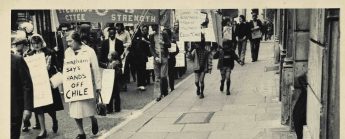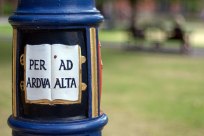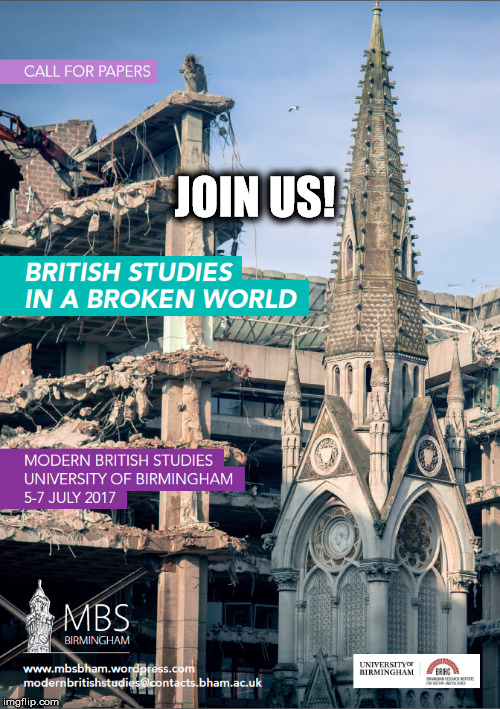Letter to Birmingham City Council by The History Department of the University of Birmingham
We are aware that the Council, along with other councils around the country, is being forced to make unprecedented cuts to expenditure as a result of central government decisions. We wish to register our condemnation of the austerity policies that have led to these cuts, and to urge the city council to do all you can to minimise their impact upon our vital cultural services.
As part of Birmingham City Council’s budget consultation, it has been proposed that Birmingham Museums Trust will receive a reduction of £500K in funding from April 2017. This is in addition to a cut of £250k that had been previously agreed by Birmingham City Council. As members of the Department of History at the University of Birmingham (and ourselves citizens of Birmingham), we are writing to urge that the cuts imposed on Birmingham Museums Trust should be reduced.
Birmingham has the largest civic museum service in England, with a collection of international significance and a growing reputation for combining academic and artistic excellence with learning, outreach and community engagement. It makes a significant difference to the lives of people in the region and, through its international loans, across the world. It would be extremely unfortunate if the long-term health of this important institution were to be permanently damaged by the need to make budget reductions.
The History Department at the University of Birmingham has an excellent record for Research Excellence: we would wish for our city’s museums to maintain their current strength and position and also reflect Birmingham’s engagement with and investment in the past. We should like to expand on these points in support of this case in the rest of this letter.
Birmingham Museums Trust is an important representative of the region’s support for the arts, alongside the sciences and technology, and plays a huge role in encouraging local, national, and international visitors to the city.
Specifically, Birmingham Museums Trust is routinely referenced by students, and potential students visiting the university, as a key selling point in their decision to attend the university, as it points to the vibrancy and dynamic culture of the city and the area. This is bolstered by the trust’s commitment to running a series of inspirational and evocative events to encourage visitors, most recently shown through their innovative ‘Night in the Museum’ events.
Another key point is the importance of this institute in facilitating the educational experiences of our students: in the seminar room, during independent research projects, and through group visits to the archive and galleries. A popular cultural internship scheme has enabled our students to work with Birmingham Museums Trust on six months placements, allowing them to undertake meaningful projects in the West Midlands region. MA students on the Modern British Studies MA in the History Department at the University of Birmingham visit the museum and art gallery as part of their studies—it is a popular, inspirational part of the course.
Similarly, the riches of the trust are of immeasurable importance for students and scholars alike in the Art History Department. In return, the trust has shown great commitment to digitalising key items from its archive, and curators and staff are always amenable to impromptu group visits and specific requests about archival resources. For students embarking on undergraduate, MA, and PhD dissertations the archives at Birmingham Museums Trust is often one of the first points of call, and the curators, archivists, and museum staff there have done much to assist students with wide ranging interdisciplinary interests.
The breadth of material in these institutions, from the finest Pre-Raphaelite art collection in the world, a staggering away of objects pertaining to world cultures, alongside key archives and objects about Birmingham’s more local culture, provides the perfect place for students to begin their exploratory projects. It is this wealth of materials, which mesh local and global interests, which we feel to be a particularly important feature of this collection. For instance, in this one building visitors can go from the ‘Birmingham: its people, its history’ gallery, before next exploring the ‘Connected Histories: Muslims in the First World War’ exhibition.
We have focused on two main points here, but there are many others, such as the potential such venues provide in educating and empowering people living and working in the area, and in providing a meeting point in the city, much enhanced by Birmingham Museums Trusts’ commitment to a whole roster of exciting and innovative events.
We feel that this venue is a gateway to knowledge, which can be enjoyed by all ages of people from all works of life. These cuts will mean inevitable cuts to staff (and low pay and insecure contrasts for existing staff); the inability to compete nationally or internationally or to curate new, enticing exhibitions; and very likely, a failure to be able to continue to build the collections, or to resource the research and cataloguing of little-known sources pertaining to Birmingham’s history but also the history of the wider world.
Birmingham has a hugely significant role in looking after many of the country’s most important cultural treasures, and we think they should be shown the attention and commitment they deserve. Such cuts would also lead to an inevitable decline in diversity; something past exhibitions have been highly commended for. Surely at a time such as this financial support for Birmingham Museums Trust should be a top priority at the Council?





